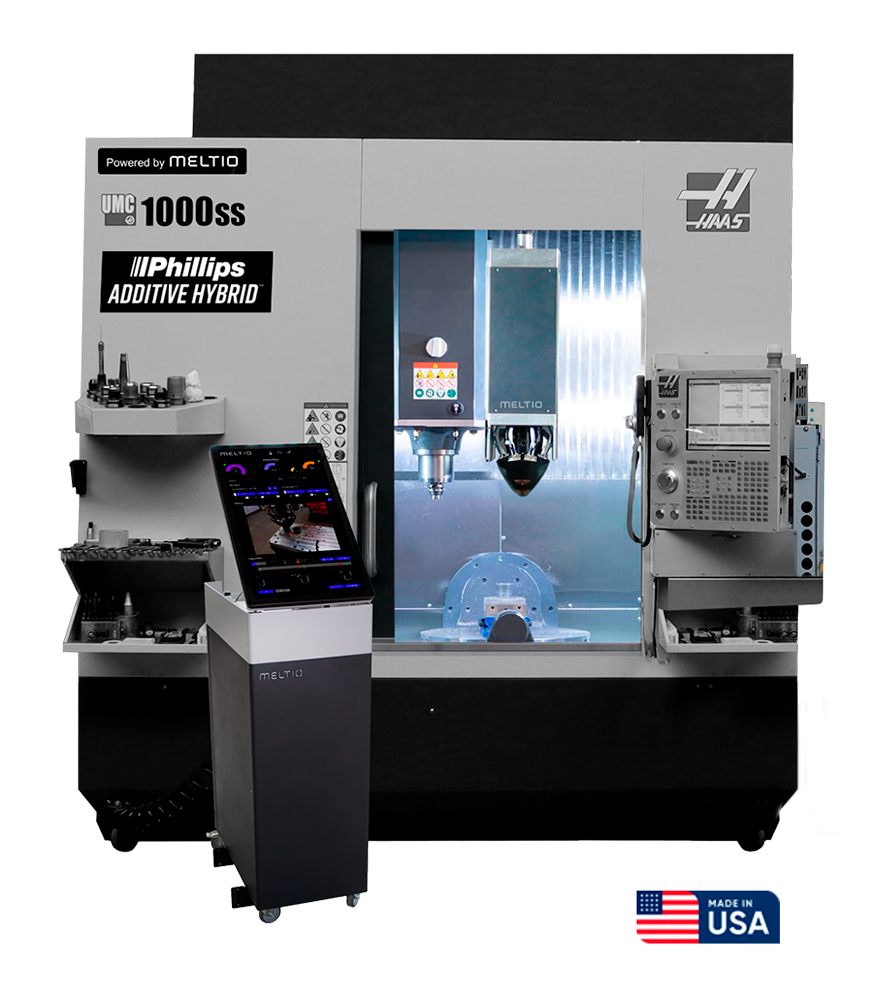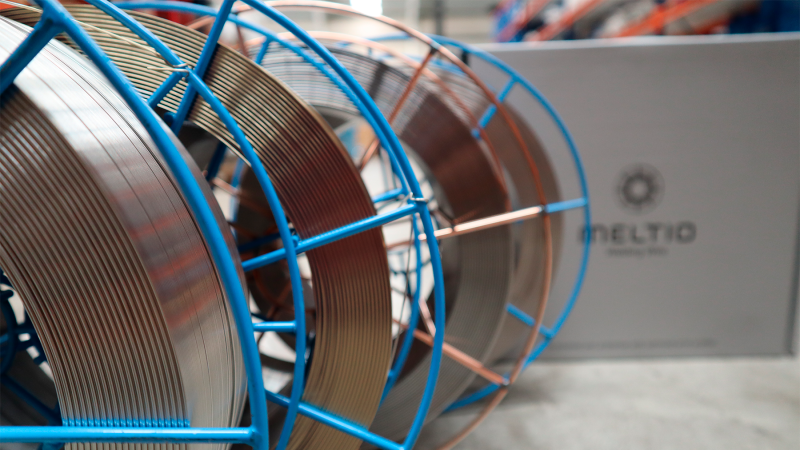Meltio Engine CNC Integration
Phillips Additive Hybrid
Phillips has taken the innovative laser metal deposition technology of Meltio and integrated it with the world-renowned Haas CNC vertical machining centers, bringing the best value additive hybrid machines to the market. Rather than buying a separate metal 3D printer, Phillips installs additive capabilities directly to your existing or new Haas machining center.
Benefit from both additive and subtractive technologies.

Unleash your Manufacturing Potential
Produce high-density parts with superior resolution in a clean working environment with wire laser DED.
Hybrid Manufacturing
Create highly complex parts with machining tolerances in the same process.
Part Repair
Repair or modify machine parts adding material just where it’s needed.
Retrofitting
Provide new capability to any CNC machine by turning it into an hybrid metal manufacturing system.
All-in-One Platform
3D print to near net shape and finish machining in a single-part setup.
Integration Technical Specifications
- General Specifications
- Wire Materials
- Key Integration Requirements
- Upgrades and Accessories
- Electrical Requirements
Dimensions (WxDxH):
390 x 700 x 1025 mm
Print Envelope (WxDxH):
Depending on the integration
System Weight:
313 lb
Titanium Alloys:
Highest strength to weight ratio and corrosion resistance.
Laser Type:
6 x 200 W direct diode lasers
Laser Wavelength:
976 nm
Power Input:
208 / 230 V single phase or 400 V three phase
Printhead Weight:
102.51 lb
Power Consumption:
2 – 5 kW peak depending on selected options
Printhead Unretracted Size (WxDxH):
255 x 320 x 1045 mm
Printhead Retracted Size (WxDxH):
255 x 320 x 872 mm
Process Control:
Closed-loop, laser and wire modulation
Enclosure:
Laser-safe, sealed, controlled atmosphere
Cooling:
Active water-cooled chiller included
Wire Feedstock Diameter:
0.8 – 1.2 mm
Wire Feedstock Spool:
BS300 or Wire drums
Stainless Steels:
Excellent strength and corrosion resistance.
Mild Steels:
Cheap and ductile, with unparalleled machinability and weldability.
Carbon Steels:
High impact strength, retain hardness at high temperatures.
Titanium Alloys:
Highest strength to weight ratio and corrosion resistance.
Nickel Alloys:
High versatility, outstanding heat and corrosion resistance.
Copper & Aluminum:
Under Development. Let me know when they are available.
Payload of at least 99 – 132 lb ensures that the robot can follow the additive toolpath precisely.
Position repeatability of ± 0.06 mm according to ISO 9283.
At least 8 Digital I/O configured according to “Communications Protocols Robot Meltio Engine”.
When using OPC DA or Socket as the default communication protocol, Meltio recommends a total of 16 Digital I/O.
The robot and the ositioner must be installed, configured, and calibrated before the Meltio Engine Integration.
Possibility to add safety integration (depending on the integration).
Laser-safe robot cell with a security circuit between the robot controller, the Meltio Engine, and the cell door interlock.
The integrator is responsible for the correct installation and operation of the security system..
*A laser safety enclosure and safety interlocks for the robot cell are not included. These additional hardware items are to be sourced by the integrator or end user customer because they will depend on the final application and installation facilities.
Dual Wire:
This option allows to 3D print two wire materials sequentially with very quick wire switches.
Laser Alignment System:
It allows users to calibrate Meltio’s multi-laser deposition head accurately and effortlessly prior to every print.
Input AC Voltage (3 Phase) – Low
220 VAC
Full Load Amps (3 Phase) – Low
70 A
Input AC Voltage (3 Phase) – High
440 VAC
Full Load Amps (3 Phase) – High
35 A
General Specifications
Dimensions (WxDxH):
390 x 700 x 1025 mm
Print Envelope (WxDxH):
Depending on the integration
System Weight:
313 lb
Titanium Alloys:
Highest strength to weight ratio and corrosion resistance.
Laser Type:
6 x 200 W direct diode lasers
Laser Wavelength:
976 nm
Power Input:
208 / 230 V single phase or 400 V three phase
Printhead Weight:
102.51 lb
Power Consumption:
2 – 5 kW peak depending on selected options
Printhead Unretracted Size (WxDxH):
255 x 320 x 1045 mm
Printhead Retracted Size (WxDxH):
255 x 320 x 872 mm
Process Control:
Closed-loop, laser and wire modulation
Enclosure:
Laser-safe, sealed, controlled atmosphere
Cooling:
Active water-cooled chiller included
Wire Feedstock Diameter:
0.8 – 1.2 mm
Wire Feedstock Spool:
BS300 or Wire drums
Wire Materials
Stainless Steels:
Excellent strength and corrosion resistance.
Mild Steels:
Cheap and ductile, with unparalleled machinability and weldability.
Carbon Steels:
High impact strength, retain hardness at high temperatures.
Titanium Alloys:
Highest strength to weight ratio and corrosion resistance.
Nickel Alloys:
High versatility, outstanding heat and corrosion resistance.
Cooper & Aluminum:
Under Development. Let me know when they are available.
Key Integration Requirements
Payload of at least 99 – 132 lb ensures that the robot can follow the additive toolpath precisely.
Position repeatability of ± 0.06 mm according to ISO 9283.
At least 8 Digital I/O configured according to “Communications Protocols Robot Meltio Engine”.
When using OPC DA or Socket as the default communication protocol, Meltio recommends a total of 16 Digital I/O.
The robot and the ositioner must be installed, configured, and calibrated before the Meltio Engine Integration.
Possibility to add safety integration (depending on the integration).
Laser-safe robot cell with a security circuit between the robot controller, the Meltio Engine, and the cell door interlock.
The integrator is responsible for the correct installation and operation of the security system..
*A laser safety enclosure and safety interlocks for the robot cell are not included. These additional hardware items are to be sourced by the integrator or end user customer because they will depend on the final application and installation facilities.
Upgrades and Accessories
Dual Wire:
This option allows to 3D print two wire materials sequentially with very quick wire switches.
Laser Alignment System:
It allows users to calibrate Meltio’s multi-laser deposition head accurately and effortlessly prior to every print.
Electrical Requirements
Input AC Voltage (3 Phase) – Low
220 VAC
Full Load Amps (3 Phase) – Low
70 A
Input AC Voltage (3 Phase) – High
440 VAC
Full Load Amps (3 Phase) – High
35 A
Phillips Additive Hybrid Models

Haas VF-2
3-Axis
Size:
3147 x 2249 mm
Travels:
X Axis
762 mm
Y Axis
406 mm
Z Axis
508 mm

Haas VF-4
3-Axis
Size:
4191 x 2312 mm
Travels:
X Axis
1270 mm
Y Axis
508 mm
Z Axis
635 mm

UMC-1000
5-Axis
Size:
3738 x 3321 mm
Travels:
B Axis – Tilt
120º to 35º mm
C Axis – Tilt
360º

Haas VF-2
3-Axis
Size:
3147 x 2249 mm
Travels:
X Axis
762 mm
Y Axis
406 mm
Z Axis
508 mm

Haas VF-4
3-Axis
Size:
4191 x 2312 mm
Travels:
X Axis
1270 mm
Y Axis
508 mm
Z Axis
635 mm

UMC-1000
5-Axis
Size:
3738 x 3321 mm
Travels:
B Axis – Tilt
120º to 35º mm
C Axis – Tilt
360º

Haas VF-2
3-Axis
Size:
3147 x 2249 mm
Travels:
X Axis
762 mm
Y Axis
406 mm
Z Axis
508 mm

Haas VF-4
3-Axis
Size:
4191 x 2312 mm
Travels:
X Axis
1270 mm
Y Axis
508 mm
Z Axis
635 mm

UMC-1000
5-Axis
Size:
3738 x 3321 mm
Travels:
B Axis – Tilt
120º to 35º mm
C Axis – Tilt
360º
Phillips Additive Hybrid Applications

Hatch Latch
Stainless Steel 316L
Size:
2 x 1 x 2 inches
Weight:
0.8 lb
Print Time:
45 min
Machine Time:
15 min

Turbine Blade
Stainless Steel 316L
Size:
1.32 D x 5.5 H x 3.23 W inches
Total weight:
1.67 lbs
Print Time:
2 hours
Machine Time:
1 hour

Dual Material Wrench
Stainless Steel 316L, H13
Size:
2 x 6 x 0.375 inches
Weight:
SS316L 1 lb, H13 0.18 lbs
Print Time:
2 hours
Machine Time:
1.5 hours

Hatch Latch
Stainless Steel 316L
Size:
2 x 1 x 2 inches
Weight:
0.8 lb
Print Time:
45 minutes
Machine Time:
15 minutes

Turbine Blade
Stainless Steel 316L
Size:
1.32 D x 5.5 H x 3.23 W inches
Total weight:
1.67 lbs
Print Time:
2 hours
Machine Time:
1 hours

Dual Material Wrench
Stainless Steel 316L, H13
Size:
2 x 6 x 0.375 inches
Weight:
SS316L 1 lb, H13 0.18 lbs
Print Time:
2 hours
Machine Time:
1.5 hour
Wire LMD for the Machine Shop
Join us for an insightful webinar held together with Phillips Corporation to discover cutting-edge advancements in metal 3D printing and its game-changing applications for machine shops.
Wire LMD for the Machine Shop
Join us for an insightful webinar held together with Phillips Corporation to discover cutting-edge advancements in metal 3D printing and its game-changing applications for machine shops.
Meltio Materials
Meltio’s Laser Metal Deposition process achieves exceptional material mechanical properties using single wire and dual wire. Choose the ideal welding wire for your application: unlimited third-party commodity material or qualified Meltio Wire Materials that secure the user experience.
Meltio Materials
Meltio’s Laser Metal Deposition process achieves exceptional material mechanical properties using single wire and dual wire. Choose the ideal welding wire for your application: unlimited third-party commodity material or qualified Meltio Wire Materials that secure the user experience.
Metal 3D Printing Experiences
USS Bataan powered by Phillips Hybrid
Phillips Corporation worked to install for the first time the Additive Hybrid powered by Meltio’s welding technology and a Haas’ CNC machine onboard the US Navy’s ship for the onboard creation of parts and to make repairs.
“The system can help the Navy overcome obsolescence issues for ships and systems that have service lives measured in decades and directly contribute to enhanced operational availability of our systems and ships.” – says NAVSEA Chief Engineer Rear Adm. Jason Lloyd.
Get a Quote
Phillips Additive Hybrid
Receive a tailor-made offer within 1 – 2 business days.



